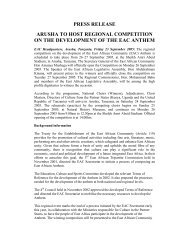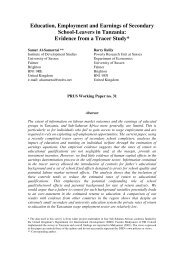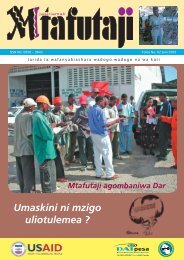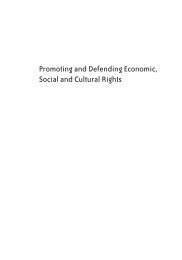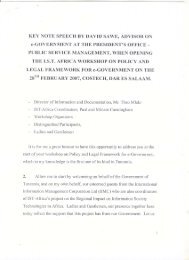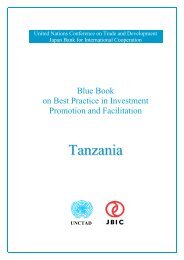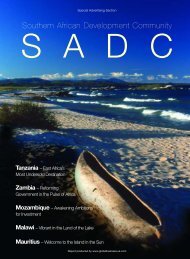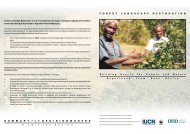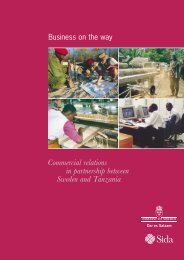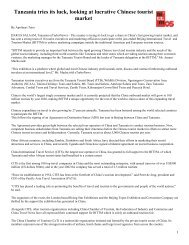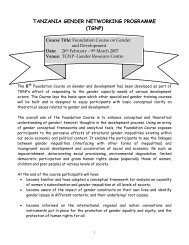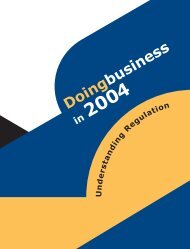The Girl-Child and Government Service Provision.pdf - Tanzania ...
The Girl-Child and Government Service Provision.pdf - Tanzania ...
The Girl-Child and Government Service Provision.pdf - Tanzania ...
- No tags were found...
You also want an ePaper? Increase the reach of your titles
YUMPU automatically turns print PDFs into web optimized ePapers that Google loves.
power <strong>and</strong> wealth. But it fails to draw this conclusion itself,which leads to several subsidiary weaknesses.” 4Incomplete empowerment can be illustrated in examiningeducation for the girl-child. This could be called theCinderella scenario; that is, the girl can attend school onlyafter all the chores are completed. Mere recognition fromgovernments, teachers <strong>and</strong> parents that girls need to attendschools is not enough. To empower girls fully <strong>and</strong> togive them opportunities for a better tomorrow, adultsmust work to reduce the workload for girls at home inorder to allow them more time to concentrate on schoolwork.Empowering girls requires poor parents to forgodomestic <strong>and</strong> sometimes economic assistance. In mostpoor countries children are labour assets as well as insurancefor parents. Giving children the opportunity to attendschools <strong>and</strong> to tend to their schoolwork means loss ofincome <strong>and</strong> help as well as taking on additional costs insupplies <strong>and</strong> other items necessary for school. Who is tobe responsible for meeting the costs of more girls attendingschool? A rights-based approach to education for girlsrequires cooperation <strong>and</strong> assistance from the community<strong>and</strong> local <strong>and</strong> national government. Via the commitmentsmade in the MDGs, the IFIs such as the World Bank, theIMF <strong>and</strong> the United Nations, as well as bilateral donors indeveloped countries, are responsible for ensuring that parentshave what it takes to educate their children, particularlygirls. Complete empowerment of the poor meansthat there should be coherence in the support – economic,social <strong>and</strong> political – of families from the communityto the IFI levels.Parents <strong>and</strong> community members should also be ready<strong>and</strong> willing to seek the children’s inputs into policy formulationsthat could potentially affect girls (political support).In accepting the principle that girls have a right to basiceducation, governments, teachers <strong>and</strong> parents should alsorecognise other aspects of rights for girls (social support).Some might argue that a discussion of service provisionsfor the poor would not be complete without discussingthe rights of the poor to ask for better services. Financialsupport for those who do not have the means to sendtheir children to schools must be an obligation for local<strong>and</strong> national governments, through the use of grants ofconcessional funding from the Bank (economic support).Indeed, the Bank’s support of Education for All <strong>and</strong> its planto put countries on a Fast Track Initiative to meet theneeds of basic education for all primary school educationby 2015 is a commendable step. Greater collaborationamong the Bank <strong>and</strong> UNICEF <strong>and</strong> UNESCO to work towardsa more holistic approach to education of children –that includes rights – would generate greater momentumfor reform of the power relations.Empowerment of girls is also incomplete if other aspectsof education are not addressed, such as the ones omittedby the WDR 2004: curriculum design, pedagogical methods,textbooks, teacher training, school construction <strong>and</strong> newinformation technologies. Though the WDR 2004 callsthem “proximate determinants of success,” having genderfriendlycurricula, teachers with underst<strong>and</strong>ing of genderissues <strong>and</strong> separate <strong>and</strong> private toilet facilities are extremelyimportant to retention of girls in schools. Moreover,ways of utilizing new technologies to enable girls toobtain remote schoolings can also contribute to empowermentof the girls <strong>and</strong> address the gender-equality dimensionof the MDGs.<strong>The</strong> Bank is presently one of the largest investors in hum<strong>and</strong>evelopment. <strong>The</strong> Human Development <strong>and</strong> SocialDevelopment, Gender <strong>and</strong> Inclusion categories made up20 per cent of the $US11.2 billion budget in fiscal 2003. 5However, efforts by the Bank to empower the poor fallshort of giving them the rights to voice their ideas <strong>and</strong>opinions when it comes to objections against WorldBank–funded projects. For instance, the Bank providedfunding for an independent review of the extractive industry– the Extractive Industry Review (EIR). <strong>The</strong> strong recommendationsput forward by Dr. Emil Salim <strong>and</strong> the independentexperts to stop projects in mining, oil <strong>and</strong> gasthat violate human rights were rejected by the Bank’smanagement. 6 Additional reference to human rights is alsofound in the EIR’s recommendation that requires projectsto first seek “prior <strong>and</strong> informed consent” of the local <strong>and</strong>indigenous people before oil, gas <strong>and</strong> mining projects areundertaken. <strong>The</strong> Bank refuted this statement because itcould violate local laws. <strong>The</strong> Bank’s eschewing its responsibilityto support the rights of project-affected people iscontradictory to the WDR 2004’s call of “empowering thepoor” <strong>and</strong> “putting the poor in the driver’s seat”. This is aprime example of incomplete empowerment – recognisingthat the poor need to have a say vis-à-vis the private sector<strong>and</strong> yet at the same time taking no responsibility forhelping the poor become empowered against unjust laws,whether local or national.Full Bank support for holistic empowerment of the pooris crucial to making the poor effective managers of service<strong>The</strong> <strong>Girl</strong>-<strong>Child</strong> <strong>and</strong> <strong>Government</strong> <strong>Service</strong> <strong>Provision</strong> 81



